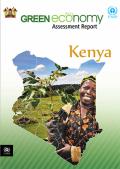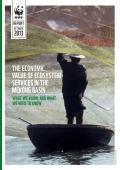
Kenya has one of the most dynamic economies in Africa, yet it is facing a number of pressing economic, environmental and social challenges. In recent years, Kenya has adopted several green economy-related approaches and policies, which include implementing renewable energy feed-in tariffs in 2008, embedding sustainable natural resource utilization into its 2010 Constitution and mainstreaming green economy in its Second Medium Term Plan (2013-2017).
In this context, the Ministry of Environment, Water and Natural Resources, in partnership with UNEP, commissioned a study to assess the economic benefits and challenges of investing in priority economic sectors in support of Kenya’s transition to a green economy. The study examines investments under “business-as-usual” (BAU) compared to green economy scenarios in four key sectors that are critical for the country’s green growth, namely: agriculture, energy, manufacturing and transport.
This publication informs policy makers and practitioners involved in developing and monitoring green growth strategies. It proposes a framework for green growth indicators that seeks to respond to the context of developing countries and their expressed policy needs. The proposed framework for green growth indicators is based on a wider concept of quality of growth, and puts attention on five main dimensions of economic development - equity and inclusiveness; efficiency and productivity; structural transformation; investment in natural capital; and planetary boundaries. ESCAP’s framework aligns with previous work on green economy and green growth indicators with particular attention to inequality and access to basic resources. It recognizes the need to assess and mitigate risks – to set targets to ensure that economic activity and its resource use consequences stay within planetary limits. The importance of governance for each element of the framework is also emphasized.

In green economies, natural capital is incorporated into measurement of societal progress and equity, and recognized and managed as a fundamental pillar of economic and human well-being. The Lower Mekong region must demonstrate success in living up to commitments to maintain ecosystem integrity before claims to having ‘greened’ growth can be made. A first step in making this commitment is ensuring that there is adequate information available on the socioeconomic importance of ecosystems and the services they provide. Ecosystem services valuation is a basic component of the evidence base for decisions to invest or divest in maintaining natural systems.
A decent environmental quality is a necessary condition for survival of humankind in general and human development in particular. Environmental pollution is a great challenge in developing countries, where especially the poorest are most likely to suffer. Reflecting the state and the dynamics of the environment is essential for science and policy advice. Environmental indicators capture the physical, biological or chemical characteristics of the environment. Environmental composite indicators merge several environmental indicators in order to summarise the multifaceted state of the environment at national level into one single score. These composite indicators allow for cross-country comparisons. The analysis here includes four cross-country composite indicators: the Environmental Vulnerability Index, the Environmental Performance Index, its predecessor the Environmental Sustainability Index and the Ecosystem Wellbeing Index. In addition, the dimension Environmental Wellbeing of the Sustainable Society Index and the Living Planet Index are analysed. Currently, the latter has mainly been constructed at a global scale with only limited availability at national level.
The working paper is a response to the call for the UN system to support countries interested in pursuing green economy policies by providing methodologies for their evaluation. It aims to provide guidance to policy analysts and advisers, and other stakeholders, who are involved in developing green economy policies by using indicators as a tool for identifying priority issues, formulating and assessing green economy policy options, and evaluating the performance of policy implementation. Emphasis is placed on policy options with “multiple dividends” across the environmental, social and economic dimensions of sustainable development.
